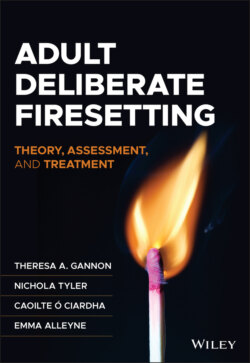Читать книгу Adult Deliberate Firesetting - Theresa A. Gannon - Страница 7
About the Authors
ОглавлениеTheresa A. Gannon, DPhil, CPsychol (Forensic), is a professor of forensic psychology and director of the Centre for Research and Education in Forensic Psychology (CORE-FP) at the University of Kent, UK. Theresa also works as a practitioner consultant forensic psychologist specialising in deliberate firesetting for the Forensic and Specialist Service Line, Kent and Medway Social Care and Partnership Trust, UK. Theresa has published over 150 chapters, articles, books, and other scholarly works in the areas of male- and female-perpetrated offending. She is particularly interested in the assessment and treatment of individuals who have set deliberate fires. In 2012, Theresa led the development of the first comprehensive theory of adult deliberate firesetting (named the Multi-Trajectory Theory of Adult Firesetting or M-TTAF). After leading a series of research studies examining the treatment needs of adult firesetters, Theresa developed the first standardised treatment programs for firesetters (the Firesetting Intervention Programme for Prisoners [FIPP] and Firesetting Intervention Programme for Mentally Disordered Offenders [FIP-MO]), which are now implemented in prisons and hospitals internationally. In 2016, Theresa was lead recipient of the Economic and Social Research Council’s (ESRC’s) Outstanding Impact in Society Award for her theoretical work and treatment provision regarding deliberate firesetting.
Theresa is lead editor of several books, including Aggressive Offenders’ Cognition: Theory, Research, and Treatment (2007: Wiley); Female Sexual Offenders: Theory, Assessment, and Treatment (2010: Wiley-Blackwell); and Sexual Offending: Cognition, Emotion, and Motivation (2017: Wiley-Blackwell). Theresa is also co-editor of several other books. Key examples include Firesetting and Mental Health (2012: Royal College of Psychiatrists); What Works in Offender Rehabilitation: An Evidence-Based Approach to Assessment and Treatment (2013: Wiley-Blackwell); and The Psychology of Arson: A Practical Guide to Understanding and Managing Adult Deliberate Firesetters (2015: Routledge).
Nichola Tyler, PhD, is a lecturer in forensic psychology at Victoria University of Wellington, New Zealand. Nichola completed her PhD in forensic psychology in 2015 at the University of Kent, UK. Both her PhD and post-doctoral research focused on understanding firesetting by adults with a diagnosed mental illness. Nichola now leads the Firesetting and Forensic Mental Health Lab (FFMH Lab) at Victoria University of Wellington, where she continues to conduct research on deliberate firesetting by both youth and adults. Nichola has published over 40 journal articles, book chapters, and professional publications on the topics of deliberate firesetting, sexual offending, and rehabilitation. Nichola developed one of the first micro-theories of adult deliberate firesetting (the Firesetting Offence Chain for Mentally Disordered Offenders [FOC-MD]) and led the evaluation of the first standardised treatment programme for adults with a mental illness who have set deliberate fires (FIP-MO). On the basis of this work, she received the 2016 Kent and Medway NHS Trust Achievement in Research Award and was highly commended in the Early Career Researcher category in the 2016 Kent Innovation Awards. Alongside her academic roles, Nichola has experience of working in secure services with men and women who have set deliberate fires. She has also provided training to professionals internationally on understanding, assessing, and treating individuals with deliberate firesetting.
Caoilte Ó Ciardha, PhD, is a senior lecturer in forensic psychology at the University of Kent, UK. He completed his PhD in forensic cognitive psychology at Trinity College Dublin in 2010. His research focuses on the role and function of psychological factors in the aetiology of offending behaviours and in desistance from offending. Caoilte is particularly interested in models of offending that employ a social cognition framework. He works predominantly on the problems of sexual aggression and deliberate adult firesetting. Caoilte has published over 40 journal articles or other scholarly works on offending behaviour and holds associate editor positions at Psychology, Crime and Law and Sexual Abuse. In 2016, his research on adult firesetting was recognised as co-recipient of the ESRC’s Outstanding Impact in Society Award. He is a regular contributor to television documentaries—typically in the Irish language—including Finné: Scéal Martin Conmey, winner of the Law Society of Ireland Justice Media Award for Human Rights/Social Justice Reporting 2019. Caoilte has received research funding from organisations, including the National Organisation for the Treatment of Abuse, the police, and UNICEF.
Emma Alleyne, PhD, is a reader in forensic psychology at the University of Kent, UK. She completed her BSc (honours) in psychology at McMaster University (Canada), followed by her MSc and PhD in forensic psychology at the University of Kent. Emma has published over 40 journal articles, book chapters, and government reports on the topics of gang-related violence, sexual offending, firesetting, and animal abuse. Her theoretical and empirical work broadly examines the social, psychological, and behavioural factors that explain various types of aggressive behaviour. Emma now leads a research programme on the aetiological factors associated with animal abuse. She has developed the first ever offence process model of animal abuse, highlighting the interactions between distal and proximal factors unique to this type of offending. Her more recent work has involved the use of innovative methods (e.g., cognitive tasks, virtual reality) to pursue research lines that investigate how offence-supportive attitudes predispose individuals to harm animals and the regulatory processes involved in triggering this type of offending behaviour. In addition to her research activities, Emma has experience working as a practitioner in secure settings delivering individual and group-based offending behaviour programmes.
